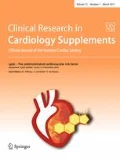Zusammenfassung
Im letzten Jahr wurden mehrere große Interventionsstudien zur Verhinderung makro- und mikrovaskulärer Komplikationen, besonders aber zur Senkung der Mortalität bei Patienten mit Typ-2-Diabetes durch normnahe Blutzuckereinstellung abgeschlossen. Nachdem die ACCORD-Studie wegen erhöhter Mortalität in der intensiv behandelten Gruppe abgebrochen wurde, bestätigten die folgenden Studien diesen Befund nicht. Allerdings zeigte sich auch in der ADVANCE- und VADT-Studie kein Nutzen einer scharfen Blutzuckereinstellung mit einem HBA1 c-Zielwert <6,5%. Dagegen zeigte sich in der Langzeitauswertung der UKPDS-Studie (Nachbeobachtung >10 Jahre) ein deutlicher Benefit der anfangs intensivierten Blutzuckertherapie. Offensichtlich ist eine frühzeitige gute Blutzuckereinstellung für das weitere Schicksal der Patienten auch hinsichtlich makrovaskulärer Komplikationen entscheidend; nach längeren Diabetesverlauf, bereits manifester KHK und zuvor schlechter Blutzuckereinstellung ist der Benefit einer scharfen Blutzuckereinstellung gering. Ein Teil der Patienten wird durch Nebenwirkungen der Therapie z.B. Hypoglykämien sogar gefährdet, so dass hier ein moderateres Therapieziel – z.B. ein HBA1 c-Wert von 7% – angestrebt werden sollte.
Abstract
Last year several important interventional studies investigating how good glucose control in patients with type 2 diabetes may avoid micro- and macrovascular complications and mortality were completed. However, the ACCORD study was stopped prematurely because of increased mortality in the intensively treated patient group but following studies have not confirmed this finding. Indeed, in ADVANCE and VADT, there was also no benefit of good glucose control with an HBA1 c target below 6.5%. On the other hand, the UKPDS study showed in the longterm follow-up (more than 10 years) a clear benefit of good glucose control in the early intensively treated patient group. Obviously, early, good glucose control is deciding the fate of the patient in the long run, especially with respect to macrovascular complications. In the long-term, the benefit for persons with already manifested coronary heart disease and poor glucose control prior to good glucose control is limited. For some patients, this may be even dangerous because of therapy side effects, such as hypoglycemia. For these patients, a more conservative glucose target, e.g., a HBA1 c value of 7%, may be recommended.
Literatur
UK Prospective Diabetes Study (UKPDS) Group (1998) Intensive blood-glucose control with sulphonylureas or insulin compared with conventional treatment and risk of complications in patients with type 2 diabetes (UKPDS 33). Lancet 352:837–853
Gaede P et al (2003) Multifactorial intervention and cardiovascular disease in patients with type 2 diabetes. N Engl J Med 348:383–393
The Diabetes Control and Complications Trial Research Group (1993) The effect of intensive treatment of diabetes on the development and progression of long-term complications in insulin-dependent diabetes mellitus. N Engl J Med 329:977–986
Nathan DM et al (2005) Intensive diabetes treatment and cardiovascular disease in patients with type 1 diabetes. N Engl J Med 353:2643–2453
Gerstein HC et al (2008) Effects of intensive glucose lowering in type 2 diabetes. N Engl J Med 2008, 358:2545–2559
Patel A et al (2008) Intensive blood glucose control and vascular outcomes in patients with type 2 diabetes. N Engl J Med 358:2560–2572
Duckworth W et al (2009) Glucose control and vascular complications in veterans with type 2 diabetes. N Engl J Med 360:129–139
Berghe G van den et al (2001) Intensive insulin therapy in the critically ill patients. N Engl J Med 345:1359–1367
Berghe G van den et al (2006) Intensive insulin therapy in the medical ICU. N Engl J Med 354:449–461
Malmberg K et al (2005) Intense metabolic control by means of insulin in patients with diabetes mellitus and acute myocardial infarction (DIGAMI 2): effects on mortality and morbidity. Eur Heart J 26:650–661
Brunkhorst FM et al (2008) Intensive insulin therapy and pentastarch resuscitation in severe sepsis. N Engl J Med 358:125–139
Wiener RS, Wiener DC, Larson RJ (2008) Benefits and risks of tight glucose control in critically ill adults: a meta-analysis. JAMA 300:933–944
Holman RR et al (2008) 10-year follow-up of intensive glucose control in type 2 diabetes. N Engl J Med 359:1577–1589
Holman RR et al (2008) Long-term follow-up after tight control of blood pressure in type 2 diabetes. N Engl J Med 359:1565–1576
Dormandy JA et al (2005) Secondary prevention of macrovascular events in patients with type 2 diabetes in the PROactive Study (PROspective pioglitAzone Clinical Trial In macro-Vascular Events): a randomised controlled trial. Lancet 366:1279–1289
Author information
Authors and Affiliations
Corresponding author
Rights and permissions
About this article
Cite this article
Lohmann, T., Möhlig, M. & Pfeiffer, A. ACCORD, ADVANCE und VADT – Paradigmenwechsel in der Diabetologie?. Clin Res Cardiol Suppl 4 (Suppl 2), 196–199 (2009). https://doi.org/10.1007/s11789-009-0066-z
Published:
Issue Date:
DOI: https://doi.org/10.1007/s11789-009-0066-z

